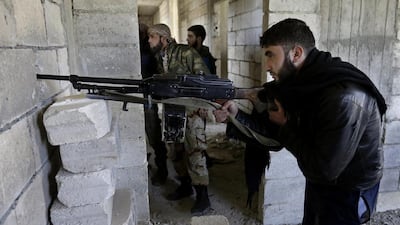US-backed SDF and Free Syrian Army groups in Syria are earning thousands of dollars facilitating the smuggling of ISIL fighters throughout eastern and northern Syria.
Smuggling out of ISIL held territory often begins at an assembly point in the towns of Hajin or Al Shafah by motorbike, according to one source in the international coalition.
Local guides escort the fighters, who are forced to surrender their personal weapons, north through minefields to the SDF controlled town of Al Shaddadi. Bribes, sometimes running into the thousands, are repeatedly paid at FSA and SDF run checkpoints along the routes.
The cost of smuggling is determined by a variety of factors including the ISIL members rank and nationality. Local ISIL members can pay to be smuggled out of ISIL held territory in eastern Syria from $2000, with that price increasing to $5000 for a foreign fighter, whilst a crossing into Turkey can cost upwards of $10,000. But prices are volatile and dependent on the local security situation, as one person involved in the networks said “prices can multiply up to four times overnight”.
Smugglers are then moved north to Manbij and pass through the Al-Awn checkpoint where some of the largest bribes are paid to FSA fighters manning the chekpoints. From there they are taken west through Afrin to the town of Daret Izza in northern Idlib. From Daret Izza they then head to the local bus station where they can travel throughout the province on local buses.
Foreign fighters attempting to leave with their families often send their families along the routes first, where they set up safe-houses on their arrival in SDF and FSA held territory. One route usually requires multiple guides, and smugglers often wait hours to ensure that the checkpoint guards on main roads are of the same ethnicity as them.
Those that want to leave Syria are forced to travel to FSA territories in Idlib, where the border with Turkey is less fortified than SDF held areas where the Turkish government fear PKK infiltration.
The funding for the smuggling enterprise comes from a number of places, regressive taxation over several years has allowed many ISIL fighters to accrue vast personal wealth, a RAND Corporation report published in 2015 estimated the group’s wealth at more than $1.2 billion.
__________
Read more
6,000 ISIL fighters could return to Africa, AU warns
Al Qaeda's 're-radicalisation' schools lure ISIL fighters in Syria
__________
Officials told The National they believe the group have also buried vast quantities of cash in villages across eastern Syria – envisaging such a time when the money would be needed.
The sources added that they believe that one such stash is in Gharanij, a small town in the Deir Ezzor countryside recently captured by Syrian Democratic Forces.
In one case another rebel group - the Turkistan Islamic Party, a group based in Northern Syria, contributed to the paying of $50,000 for the smuggling of an ISIL logistics emir from eastern Syria to Idlib in order to join their group.
In northern Syria, smugglers are often members of FSA groups. In Idlib, sources told The National that Ahrar Al-Sharqiya were particularly involved in the smuggling operation. The group is largely comprised of former members of Islamist groups such as Ahrar Al-Sham from Deir Ezzor and Hasakah province.
The extent of the smuggling is significant, in recent months as many as 450 ISIL members have made the trip to Hama in central Syria and hundreds more to rebel held Idlib. Dozens have also made it as far as Tripoli in Lebanon and others into Turkey.
Those directly involved in the smuggling networks insist that Euphrates shield FSA groups, and the Syrian Democratic forces are fully aware of the smuggling taking place in areas under their control, but the financial incentives offset any motivation to clamp down on the act.
A source told The National that there was evidence of forwards planning for at least some of those now paying smugglers to cross Syria. "ISIL members were well aware that the liberation operations for Iraq and Raqqa were matter of when, not if. Prior to the liberation operations, many paid for forged documents - such as passports - to enable them to move out of the cities. This was especially the case for those in Mosul."
“There is strong anecdotal evidence to suggest that some of the senior members re-located or were smuggled to other ISIL locations. Such personalities were sent forward to coordinate. But the forward planning that goes into such relocations does not apply to the majority; rather, self-interest and the basic instinct of survival have gripped most members.”
Speaking in Washington last week U.S. Secretary of Homeland Security Kirstjen Nielsen warned of the threat posed by fighters attempting to return home. “We are entering a new phase of the fight. Jihadists are going underground, dispersing to other safe havens -including on the internet and returning to their home countries”.


